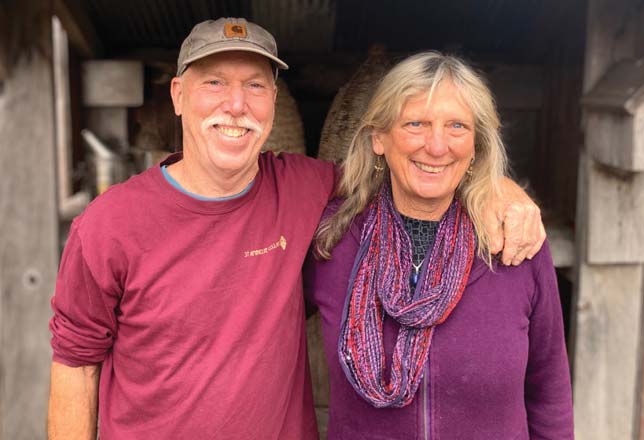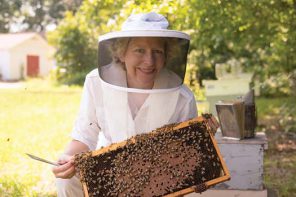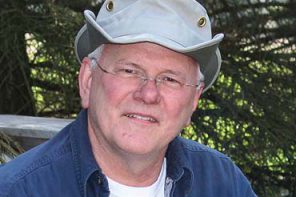By: Ross Conrad
A couple years ago I had the good fortune to be able to attend the first ever, Northern Natural Beekeeping Conference, held in Benzonia, Michigan. The conference was sponsored by the Benzie Bee Guild and held in conjunction with Grow Benzie whose mission includes increasing access to healthful foods, jobs, life skills, and each other by providing a community place that supports and nurtures these activities.
If you have ever been to Northern Michigan you know what a beautiful part of the country it is. The conference was held on the grounds of St. Ambrose Cellars, a meadery that is the brainchild of Kirk and Sharon Jones. I later learned that St. Ambrose Cellars was not the start of Sharon and Kirk’s efforts but simply the latest in a long and winding road of bee related enterprises and adventures that, as they tell it, got its start in the late 1970s.
Kirk Jones: “When I was a kid, I lived by the bayous of Louisiana, and spent a lot of time crawfishing, hiking, and exploring the woodlands. One day I discovered a fallen hollow log with clouds of bees and was mesmerized by the calm hum and the rich scent of the beeswax and honey. This early fascination evolved into an opportunity to purchase two hives over 40 years ago that has grown into a lifelong pursuit of commercial beekeeping for Sharon and myself.”
Sharon Jones: “When Kirk and I were married in 1979, we started a large garden at our little homestead in Honor, Michigan. We bought our first couple hives and met our mentor Oral Kuch who had raised bees there his whole life. We read everything and spent time just observing our new little families coming and going. I will never forget our first swarm and climbing a cedar tree armed with a pillow case behind my new husband, questioning if I was willing to follow him anywhere.”
That first swarm eventually led to the development of Sleeping Bear Farms, a seven to eight thousand hive operation that ranges between Florida and Michigan. Dave Nesky manages the Michigan bees, while Jason Favreau and their son, Travis Jones, manage the Florida bees. The couple first started taking their bees down to Florida around 1992 in order to survive after severe mite devastation. The warmer climate and longer days allowed their bee’s greater access to nectar and pollen and provided more time to make splits and treat when needed.
BeeDazzled was born as an offshoot of Sleeping Bear Farms as Sharon began to develop beeswax products, including candles, soaps, and bodycare products from the copious amounts of beeswax available. Sharon manages the daily operations and is the prime creator of new products.
SJ: “We started out as Jones Bee Yards in our garage and date night typically would find us bottling honey or building equipment. We were both very hands on and enjoyed just beeing together. As I took on distribution and accounting, so I could be with our children more and put food on the table, Kirk was handling the bees primarily and we continued to grow. I started BeeDazzled in 1984 when I began to make candles for our co-op (Oryana) and craft fairs. BeeDazzled Gifts from the hive is a small cottage industry which led me to developing the line of soaps, skincare and aromatherapy which has a large following.”
KJ: “We originally lived in a log cabin and used the garage to harvest the honey and pack it for our local food co-op. The candles were dipped on a wood range and hung over the washing machine. Sharon kept her Teepee in the backyard for summer quarters. It was the era of back-to-the-lander’s inspired by the likes of Mother Earth News. Our first honey sales were delivered in our Dodge Dart with the back seat removed to accommodate the cases of honey.”
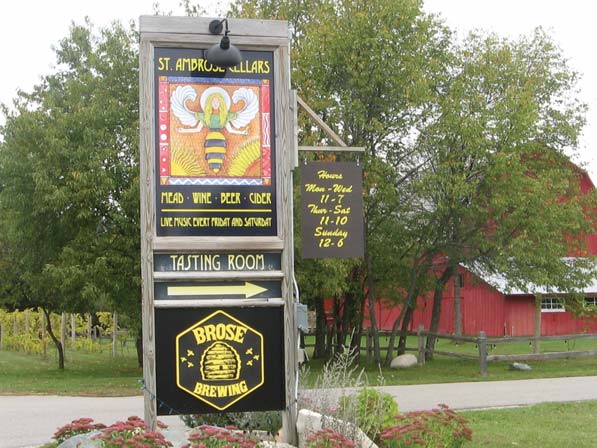
St. Ambrose Cellars also boasts a large post and beam barn (in background) that is available for special events.”
Kirk had an interest in making honey wine and over the years had a few successes, which led to encouragement from friends and family to make it available to the public. Some of their early meads were more akin to rocket fuel and they still chuckle about that. In 2010, they applied for a federal permit and St. Ambrose, the patron saint of beekeepers, as the name of their enterprise. They hired experienced winemakers, trained at Michigan State University, to develop and produce their beverages. Nowadays, the meads produced are much smoother.
Following the success of St. Ambrose’s mead, Sharon and Kirk began to make red and white wines from high quality Michigan grown grapes, as their winemakers had the experience and desire to do so. One of their mead-makers, Nate Ely, was also a very accomplished beer brewer, so beer was added to their offerings. St. Ambrose’s patrons nicknamed it Brose beer, so they adopted the name. Some of their beer contains honey, which is known by the “old world” name, Braggot.
KJ: “In 2010, we obtained our Federal TTB permit to make mead, or honey wine. We quickly outgrew our Michigan honey facility and purchased the neighboring farm to build the present tasting and production room for St. Ambrose. In 2015, we obtained our beer license to make Brose beer to pair with the mead. Then the winemakers we had hired segued into red and white wine production from grapes we purchase. It takes about 45 people to keep everything going.”
Meanwhile, Sharon has her own bees to play with.
SJ: “My approach at home is based on natural beekeeping principles and I personally keep around 25 hives plus the 6 hives at Grow Benzie. My bee yard is separate from our Sleeping Bear Farm bees and is a good pilot yard for applying organic mite controls, examining the results, and following queens.”
Like other businesses, the couple has had to adapt their business strategies in order to cope with this year’s new Covid-19 realities.
SJ: “At Grow Benzie we started out with only minor losses this year, only to have a bear come in and take out a hive in June. The drought in July had an effect on our crop, as well as the star thistle weevil which has become more prevalent here in North West Michigan. BeeDazzled has adapted to Covid by offering online ordering as well as curbside pick-up. We are experiencing some supply/demand challenges with packaging and ingredients, but have been able to maintain most of our products.”
KJ: “We started out the year with plenty of healthy bees to ship to California for Almond pollination and left some at our Florida farm for Sharon and the girls to make up new queen cells for splits starting in February. We make new hives up every year in the panhandle of Florida, which has multiple successions of blooming plants with ample nectar and pollen to make increases and make good quality honey. We take our best hives to river and creek locations to make Tupelo honey, which has been less predictable over the years, but enough for our website and Amazon demand. After Almond pollination, we shipped most of the bees to our northern Michigan headquarters to stage for cherry and apple pollination, which has been very steady over the years.
“Sales of our packaged honey was phenomenal during the Covid shutdown with many people shopping online. We could hardly keep up with the orders. Our sales have grown steadily over the years and we have had to purchase honey from other local beekeepers to meet demands, including this year.
“Sales at St. Ambrose Cellars, our meadery/winery/brewery were very strong after we re-opened on Memorial day. We adapted to the Covid restrictions and added many more picnic tables for our visitors to enjoy our beverages outdoors and changed to table service only, instead of using the tasting room. The response was positive and we have surpassed last year’s revenue.
“The distributor sales are at about ½ of last year’s numbers, but showing signs of life after our introduction of canned draft mead that is bolstering our bottle sales. I think most of this is due to bars and restaurants operating at half capacity, if open at all.”
Since Sharon and Kirk are each responsible for a different aspect of their growing business empire, they have varied answers when asked about their biggest challenges.
SJ: “It’s challenging to balance bees, my shop and the mentorships with good timing which is everything, and leads to responsiveness to the bees, mites, and whatever this bee season is bringing. I plan to move BeeDazzled to St Ambrose in the next year which will help to consolidate businesses and to work more closely with other family members. Our daughter came on board this Summer as GM for St. Ambrose operations, our Granddaughter is stepping into BeeDazzled customer service. This enables Kirk and I to maintain envisioning and be hands-on throughout the entire operation.”
KJ: “Our biggest focus and challenge is keeping the bees healthy. Mite control continues to dominate our concerns.”
The couple also focuses on different areas of their businesses when reflecting on their biggest successes.
SJ: “Since 2003 Kirk and I spend our winters at our southern bee ranch in the panhandle of Florida making increases and I am primarily focused on queen rearing. I run a huge 100 hive queen raising beeyard and enlist help from my students and friends which is part of their continuing education or collaboration. We raise thousands of queen cells in a season which is truly the heart of our operation. I love working with the queens in a feminine centric way and am continuously amazed by the cooperation from the bees when we focus on a caring relationship and being truly present in the yard.”
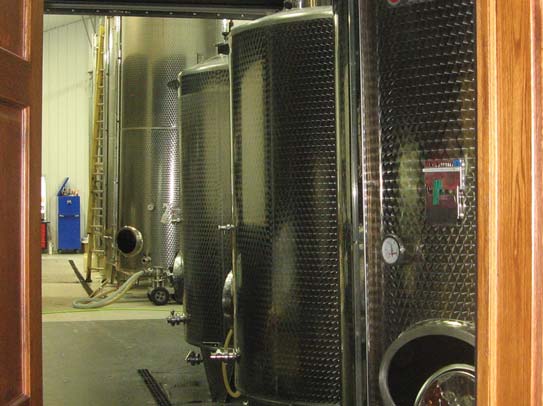
Some of the brewing tanks behind the scenes at St. Ambrose Cellars.
KJ: “I consider ourselves fortunate to have survived the economic pressures of the very low honey prices offered in the previous decades and the harsh impact of the Asian mites afflicting our honey bees. Almond pollination has been a welcome source of revenue that we have used to reinvest in new equipment and most importantly, better pay for our staff, including benefits of health insurance and 401Ks.
“Over the years we have focused on diversifying our sources of income to provide more stability for our operational revenue stream. I think this may be one of our greatest strengths.”
On top of all that they have going on, Sharon finds time to volunteer for the Benzie Bee Guild.
SJ: “The bee guild was started by my student Jaime Pennington as her 2nd year capstone project, when she moved to NC I stepped in temporarily as the program is a pass it on program and I intend to do that when the time is right. Grow Benzie is located right around the corner so it’s actually convenient for me and I have so much help from other local beekeepers. Participants in the bi-weekly hands on immersion are eager and committed to showing up and take ownership and pride in the project! Their excitement is really what carries it forward.”
So what’s next in their beekeeping evolution/journey?
SJ: “I am envisioning a queen rearing project based on bee’s we have successfully overwintered for up to seven years now. I am looking to enlist some experienced students to help with it and it would also be a great source of continuing education. I think it’s a niche that needs to be filled in our region. I get a lot of requests for mated queens, I think it would be empowering to teach people how to raise their own queens and have some on hand while promoting bee’s that winter and perform well.”
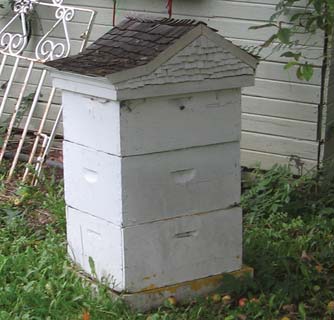
This hive of friendly Michigan bees greets visitors to BeeDazzled’s retail outlet.”
KJ: “We constantly have new ideas percolating around here. Our most recent project involves a medicinal line of CBD and honey and Sharon is working on a CBD beeswax ointment product line. We are trying it out for our aches and pains that are well earned.
“On another note, we are going to employ our new canning line that we presently use for the draft style mead and beer, and can a honey-based energy drink with natural stimulates, vitamins, and adaptogens, like ginseng. So many ideas, so little time.”
What keeps this dynamic duo going?
SJ: “I personally cannot imagine life without honey bees. They are representative of the higher forces and enrich my life daily. I am passionate about learning to listen to them and sharing what I have discovered about the importance of our relationship with honey bees. I also believe mentorship is the best way to learn and have developed an 8 month apprenticeship program for women that takes them through an entire bee season. The second year graduates focus on capstone projects which led to our “Northern Natural Beekeeping Conference” last year featuring Ross Conrad as our Keynote speaker, as well as an ongoing mentorship program at Grow Benzie which is our local community development center. We pass the learning on, people of all ages are able to come and learn about beekeeping in our onsite yard twice monthly. This year we even had a grandpa and granddaughter team. I have found this to be a pathway for people just starting out to be highly successful with their first nuc’s. There is so much knowledge out-there on the internet that can be confusing to people and lead to disastrous results for both the bees and their new keepers, our aim is building confidence and discernment with each mini workshop.”
KJ: “The honey bees provide a link for beekeepers to experience the passing of seasons, with the flowers rising from deep winter into full bloom every year, giving us a compass for our activities. There is nothing like the heady scent of fresh nectar, beeswax and pollen when entering the bee yard on a sunny day with the hum of honey bees on a nectar flow. I’d like to bottle it for the winter months…We can’t imagine a more interesting life than the path we chose to pursue beekeeping as a lifestyle and career. Beekeepers know it’s mostly hard work, but the rewards of working outdoors and following the seasons is immeasurable.”
For more information visit www.stambose-mead-wine.com or www.beedazzled.com.






